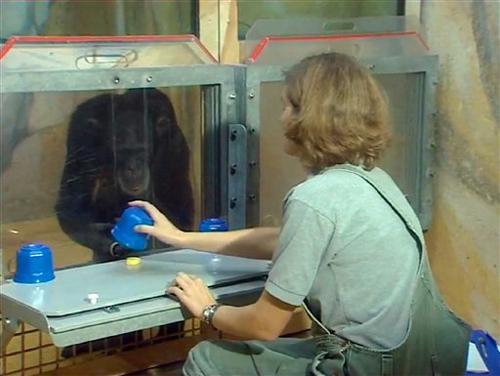Preschoolers have social edge over apes

September 7, 2007
WASHINGTON – Toddlers may act up like little apes, but researchers who compared the species concluded a 2-year-old child still has the more sophisticated social learning skills.
In one test, preschoolers who wanted a toy hidden in a trick tube intently copied a scientist’s movements to retrieve the prize. Chimps watched the lesson but then mostly tried to smash or bite open the tube.
When it came to simple math, however, the apes seemed to know more than the youngsters, apparently “adding” how many tasty raisins researchers had hidden.
In a novel study, scientists lured 106 chimpanzees, 32 orangutans and 105 toddlers to sit through five hours of testing over several days. Researchers were trying to tell which innate abilities are distinctly human.
“Human children are not overall more intelligent than other primates, but instead have specialized skills of social cognition,” concluded the lead researcher, Esther Herrmann of Germany’s Max Planck Institute for Evolutionary Anthropology. “They learn in a way that chimpanzees don’t learn.”
Get The Daily Illini in your inbox!
But the findings, published in Friday’s edition of the journal Science, conflict with other research that suggests the great apes, humans’ closest relatives, are quite good at social learning, too.
In fact, a second study in the same journal suggests chimps and monkeys have some capacity to infer someone’s intentions by their actions. That is pretty complex, human-like thinking.
In that work, the animals sought out food containers that a researcher had grasped purposefully, not just tapped, or a container that he had touched with his elbow when his hands were full, but not one elbowed when his hands were empty.
The chimps and monkeys expected someone to behave rationally and adjusted their own actions accordingly, according to the lead researcher, Justin Wood of Harvard University.
“That shows quite a subtle social understanding going on in these animals,” said Dr. Frans de Waal of Emory University’s Yerkes National Primate Research Center, a well-known expert in primate cognition who was not involved in the research published Friday.
Comparing innate abilities can shed light on the evolution of human cognition.
Rather than studying one ability at a time, Herrmann and colleagues devised a battery of tests that they administered to 2 1/2-year-old children and to apes in wildlife sanctuaries in Uganda, Congo and Indonesia.
The apes and children fared equally well on tests of how they understood their physical world. Occasionally, apes did better.
For example, chimps and preschoolers could tell at a glance which dish contained a few more raisins. But when the dishes were covered and extra raisins dropped in, the apes kept better track of which dish had more.
Herrmann speculated that perhaps everyone starts out with ape-level math skills that humans surpass upon learning to count.
Then she tested social learning – communication, imitation and gauging intent from behavior. For example, Herrmann hid a treat under one of three cups and pointed to the right one. Preschoolers were much better at knowing to follow her gestures.
Overall, the preschoolers accomplished social-learning tasks correctly 74 percent of the time, while the apes did only 33 percent of the time.
Herrmann concluded that backs one theory of the evolution of human cognition, that specialized social skills more than general intelligence explain why humans learn more, in complex cultural groups, than do other primates.
But to de Waal, the preschoolers just had to imitate another human to pass these tests, while the apes had to imitate a stranger of another species, a higher hurdle.
Herrmann chose orphaned apes raised around humans to minimize those concerns.
Other studies have found that chimps pass similar social-learning tests when they know the human tester well or when a fellow chimp is trained to administer the tests, which is the method Yerkes now uses.
Recall the trick tube that Herrmann’s apes could not open right? De Waal trained two chimps from different families to open a trick box in different ways and then sent them home. Later, their relatives mostly opened the box the way their matriarch had been trained, similar to human cultural learning.
Social learning is “maybe not as a perfect as in humans, but it’s very well-developed,” de Waal said.






